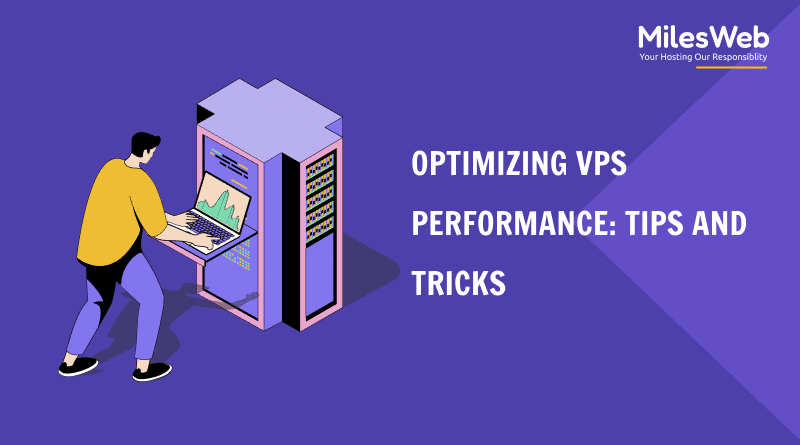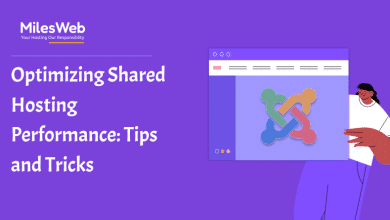
Optimizing Vps Performance: Tips and Tricks
Have you ever backed out from a website because it was too slow to load? It’s something we all have experienced! In today’s high-tech savvy world, website loading time is crucial. As 40% of users leave a website after just 3 seconds, your website needs to act like a speed machine. That’s where VPS steps in.
VPS hosting offers an effective web hosting solution that provides an ideal blend of cost and control, compared to shared hosting. For organizations and developers using VPS hosting, optimising VPS performance is important to ensure flawless management and user-experience. In this blog, we will go through the techniques to improve your VPS for an unbeatable performance.
What is VPS hosting?
VPS stands for “Virtual Private Server”. Virtual servers work independently, ensuring dedicated resources like CPU, RAM and Storage. Such a dedicated environment offers better reliability and performance compared to shared hosting.
Selecting an ideal VPS hosting plan is necessary for getting unmatched performance. Though cheapest VPS hosting plans are inexpensive, they generally come up with restrictions in resources. Estimating your current and expected resource requirements is important to avoid performance issues. Node.js hosting users always make sure that their VPS hosting plan should support the optimized software stack and offer enough resources to manage their application’s growing needs.
Tips to Optimize Your VPS
1. Periodic Resource Monitoring
Monitoring your VPS resource usage is necessary for managing its performance. It’s very important to frequently monitor metrics like CPU usage, memory allocation, storage and bandwidth. You can take advantage of the monitoring tools offered by your VPS hosting provider or third-party applications like htop or Nagios to monitor these resources. Careful monitoring allows you to detect and tackle upcoming performance issues before they cause any harm to your website or application.
2. Optimize the Software Stack
VPS performance can get influenced by the software stack you deploy. Make sure that all software elements, such as web server database and application frameworks are running on the latest version. For Node.js hosting services users, it’s beneficial to use the latest version of Node.js and libraries. Consider using less resource-intensive software like Nginx instead of Apache, to decrease resource utilisation. Frequently optimizing databases can enhance the performance.
3. Advanced Caching Strategies
Advanced caching is an important technique for enhancing VPS performance by decreasing server load. You can use subsequent caching strategies:
Browser Caching: Decrease your server requests by storing static assets like image, CSS, JavaScript in the user’s browser.
Server-Side Caching: Use caching solutions such as Memcached or Redis to save regularly accessed dynamic content to reduce database load.
Content Delivery Network (CDN): Use CDN to distribute static content, enhancing load times for users irrespective of their location.
4. Optimize Node.js Hosting Services
VPS solutions provided by MilesWeb are ideally optimized to match the scalable needs of Node.js hosting users. Node.js hosting users can achieve peak performance by performing certain optimizations.
Clustering– Node.js works on a single thread, while clustering empowers you to use multiple CPU cores, enhancing applications reliability and performance.
Asynchronous Programming– Make sure that your Node.js code utilises non-blocking I/O operations to avoid performance issues.
Enable Compression– You can use compression libraries like Gzip or Brotli to reduce data size and reduce your loading time.
5. Increase Security to avoid resource wastage
Security of your VPS is important for sustaining the performance and securing against online vulnerabilities.
Next-generation Firewall: Customise firewalls to prevent malicious traffic to shield your server.
SSH Key Authentication: SSH keys provide you safer server access. It additionally reduces the risk of brute-force attacks.
Software Updates: Ensure that your OS and software are using the latest versions and security patches to avoid potential security threats.
6. Optimize VPS Configurations
VPS hosting solutions allow seamless configuration settings, to experience remarkable growth in performance.
Restrict background Processes: Terminate unwanted services which utilise excessive CPU and memory resources.
Manage Cache and Buffer Size: Customise cache and buffer settings to your applications requirements for efficient memory operations.
7. Regular Maintenance and Backups
Periodic maintenance and backups are important for managing VPS efficiency and keeping your data safe in any condition.
Reliable Backup: Automate backup services to secure your data to ensure instant data recovery.
Junk Cleaning: Extract outdated data and unwanted applications to keep your server more efficient.
Conclusion
Fine-tuning VPS performance is significant for getting a reliable and productive hosting environment. By signing up for the ideal VPS hosting plan, monitoring and optimizing your software stack, and employing advanced caching techniques, anyone can amplify the performance of their VPS hosting. Selecting a VPS optimized hosting provider like MilesWeb, with the latest features, can increase your VPS performance and ensure a steady and scalable online presence!





Leave a Reply